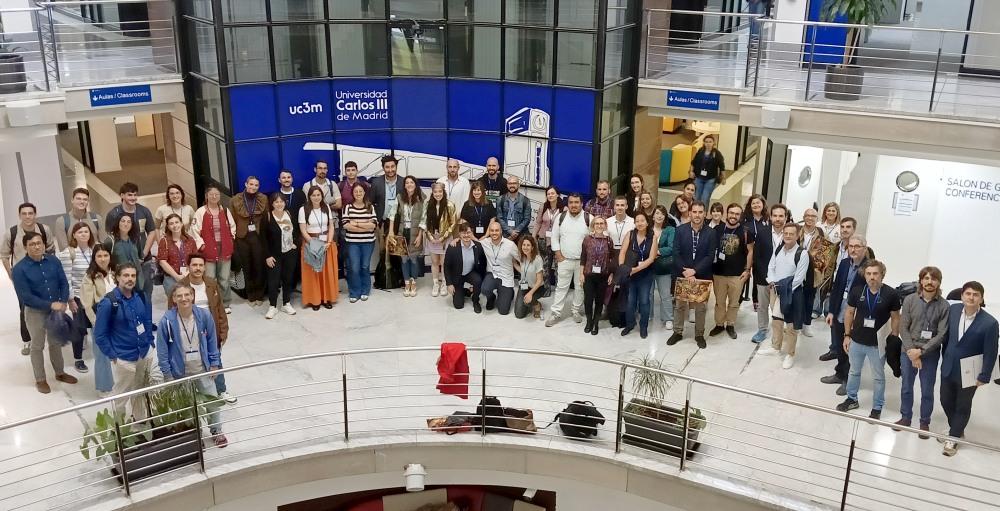Ten recommendations for young people who want to pursue a successful scientific career in Spain
According to a course organised by the Academia Joven de España, the UC3M and CSIC
10/24/24
The Universidad Carlos III de Madrid (UC3M) has hosted a specialisation course on research careers, organised by the Academia Joven de España in collaboration with the university itself, the Consejo Superior de Investigaciones Científicas (CSIC) and with the support of the company Monodon (Navantia). The course looked at some of the main issues to be taken into account as regards successfully pursuing a scientific career, from choosing a doctoral project to directing a research group.

During the course, held recently at UC3M's Madrid-Puerta de Toledo Campus and attended by more than 500 students in person and online, various speakers from the academic, technological, governmental and business sectors addressed some key issues in this field, such as: choosing lines of research, writing scientific articles, seeking funding, the importance of management, the gender perspective, mental health and the importance of public-private collaboration for the advancement of science. In addition, professional opportunities apart from the academic field were explored, such as scientific transfer, entrepreneurship and popularisation. The event was recorded and can be viewed online for free on this YouTube channel: https://www.youtube.com/@AcademiaJoven/videos
Here are ten recommendations regarding certain key issues to be taken into account when it comes to pursuing a successful scientific career in Spain:
- Funding. There are different funding opportunities available at different stages of a research career. Taking the time to learn about the calls for proposals and applying for them with guidance can help to create and consolidate research groups. There are great opportunities available regarding the frontiers of knowledge and our ability to adapt methodologies from one area of knowledge to others.
- Objectives. During the process of preparing a research project, it is important to consider its purpose but also to pay attention to its alignment with the objectives of the programme and to seek an impact in different areas (generation of knowledge, technology transfer, training of researchers, social awareness of relevant issues, etc.).
- Collaboration. Research should be a collaborative process, where projects carried out in different groups and institutions feed back into each other, providing creative solutions to emerging methodological problems and leading to a continuous evolution of the research field.
- Contacts. During the early stages of a research career, it is important to start developing an international network of contacts. For this purpose, there are numerous mobility grants available at regional, national and international level that facilitate access to prestigious research groups. Other suitable forums for this purpose involve participation in international conferences.
- Publications. When preparing a scientific article, rather than being guided by curricular purposes, it is advisable to reflect on its relevance, impact and the reproducibility of the results provided. As with grants, it is a good idea to familiarise yourself with the editorial policy and publication format by reading articles in the journal in which you wish to be published.
- Evaluation. There is a global trend, which is beginning to be seen in Spain, for scientific curricula to be evaluated in terms of quality rather than quantity. Thus, factors such as the originality of scientific contributions or their socio-economic impact are becoming increasingly important, as opposed to the number of published results and other quantitative indicators.
- Entrepreneurship. The scientific knowledge acquired also enables the launch of technology-based companies and spin-offs created on the basis of laboratory results. Although Spain's indicators are good in terms of knowledge generation, there is much room for improvement as regards the transfer of this knowledge to the business sector.
- Patents. It is important to understand and be aware of the different industrial property protection mechanisms and how they work. Aligning strategies for the protection and dissemination of results is essential, because major opportunities can be missed and potential avenues for commercialisation can be closed off. A long-term strategy for the protection and exploitation of results is therefore recommended.
- Public dissemination of science. Clearly communicating the main ideas and implications of R&D&I raises awareness of the value of research, technological advances and their benefits for society. In addition, doing so can have a positive impact on the academic career of research staff, enhancing their profile, reputation and links with companies.
- Science and public policy. There is a growing interest in having scientific advisory mechanisms that allow institutions and government representatives to make scientifically informed decisions in areas of major social importance, such as education, health, energy and industry, among others. In this context, scientific advisors should not prescribe decisions, but rather provide objective knowledge by explaining the implications of each specific action.